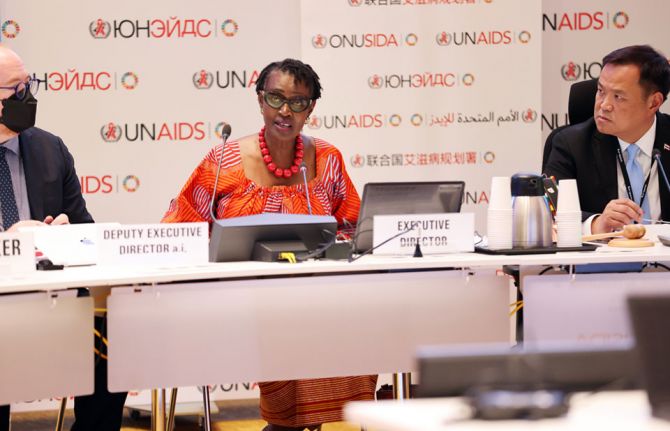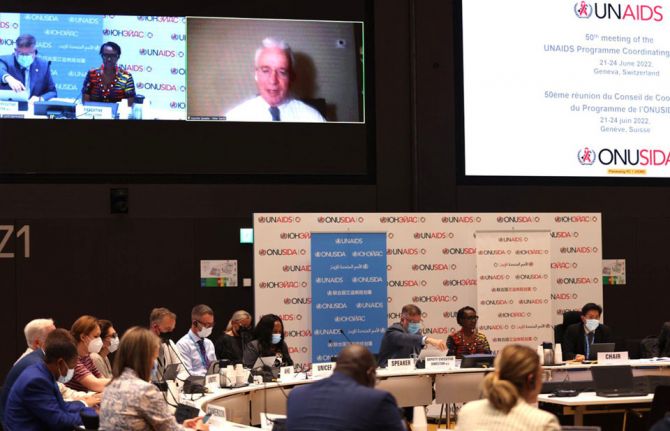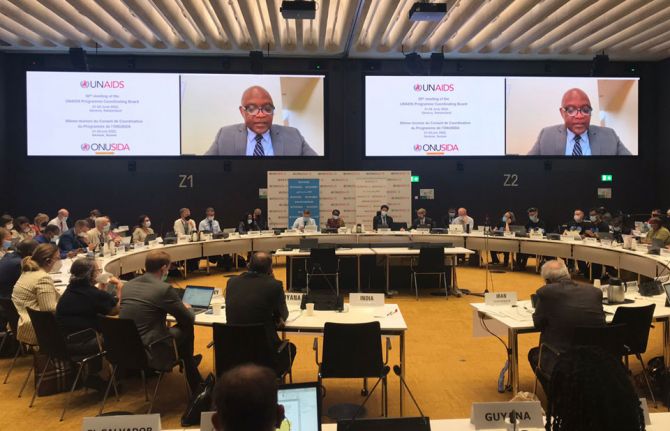



Press Release
UNAIDS, Global Fund and PEPFAR leaders make a united call to action to resource the global AIDS response
24 June 2022 24 June 2022The leaders of UNAIDS, the Global Fund to fight AIDS, Tuberculosis and Malaria and the United States President’s Emergency Plan for AIDS Relief have made a powerful joint call for a fully funded global AIDS response during the 50th meeting of the UNAIDS Programme Coordinating Board (PCB), taking place in Geneva, Switzerland.
The call by the United States Global AIDS Coordinator, John Nkengasong, the Executive Director of the Global Fund to Fight AIDS, Tuberculosis and Malaria, Peter Sands, and the Executive Director of UNAIDS, Winnie Byanyima comes ahead of the crucial 7th replenishment meeting of the Global Fund which will take place in the United States in September and against the backdrop of the continued underfunding of the UNAIDS Unified Budget, Results and Accountability Framework.
In his first international appearance since being confirmed in his post by the United States Senate in May, Ambassador Nkengasong called out the critical need for a full, successful Global Fund replenishment and for UNAIDS to be fully funded to secure further progress against the HIV pandemic.
“The Global Fund is essential. UNAIDS is essential. Money without technical policy and advocacy will not yield more people on treatment, more HIV infections averted, or human rights restored and preserved. These institutions are as important to each other as they are to the countries they support.”
Mr. Nkengasong told the PCB that the US had already committed $6 billion to the Global Fund replenishment (contingent of the target of $18 billion being fully met) and had increased its funding to UNAIDS by $5 million this year. He called on other donors to show similar commitments to increase funding.
“UNAIDS is called upon to support countries to address inequalities to remove barriers to HIV services, advocate for the removal of harmful policies and discriminatory laws that marginalize individuals and threaten human rights. These are not easy tasks. If UNAIDS is to be successful it must be fully resourced.”
In his address Mr. Sands underlined the importance of the partnership between UNAIDS and the Global Fund: “Financing the entire AIDS response to end AIDS by 2030, means fully funding ALL the partners. UNAIDS’s presence at the country level, ensuring that countries’ proposals for Global Fund programs are well designed, providing vital real-time data, and helping governments make key enabling policy reforms, is vital to ensuring that the work of the Global Fund succeeds. To enable us, fund us and UNAIDS. In full.”
In his address, Mr Sands also underscored how much work there was left to do to get the world on track to end the AIDS pandemic as a public health threat by 2030. He praised the work of governments, international partners, communities and civil society for mitigating the effects of COVID-19 on the AIDS response but said severe challenges lay ahead.
“We need to recognize for all the amazing progress made particularly over the past two decades that we are not where we want to be. We were off track against the trajectory we need to hit to achieve the 2030 goals even before COVID-19. COVID has pushed us further off track and now food shortages, food price hikes and energy price rises will make it even more difficult for poor and marginalized communities at risk of HIV.”
Ms. Byanyima called for an even higher priority for the 7th replenishment of the Global Fund and underscored the importance of partnership and cooperation in the AIDS response.
“We can end AIDS by 2030 but only if we are bold in our actions and our investments. It is far more expensive to not end the AIDS pandemic than to end it. UNAIDS partnership with the Global Fund is essential to our success. For the world to achieve the 2025 targets and get back on track toward the 2030 goal of ending AIDS, a successful 7th Global Fund replenishment is critical. The world needs to fully fund the Global Fund. And fully fund UNAIDS.”
In her speech to the PCB earlier in the week, Ms Byanyima warned that the HIV response was having to compete for resources and that global crises were making communities more vulnerable to the pandemic.
“Next month we will release our Global AIDS Report. I can tell you now that it will show a global AIDS response under severe threat. We still see remarkable resilience in efforts to stop the AIDS pandemic but there are many worrying signs.”
UNAIDS
The Joint United Nations Programme on HIV/AIDS (UNAIDS) leads and inspires the world to achieve its shared vision of zero new HIV infections, zero discrimination and zero AIDS-related deaths. UNAIDS unites the efforts of 11 UN organizations—UNHCR, UNICEF, WFP, UNDP, UNFPA, UNODC, UN Women, ILO, UNESCO, WHO and the World Bank—and works closely with global and national partners towards ending the AIDS epidemic by 2030 as part of the Sustainable Development Goals. Learn more at unaids.org and connect with us on Facebook, Twitter, Instagram and YouTube.
